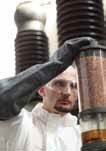Career Spotlight: Nuclear Engineer

By Gwen Myslinski
D-OH!
Though Homer Simpson may portray nuclear engineers as donut-eating slackers, that is certainly not the case. These individuals are "like a cross between a jet pilot and a firefighter: highly trained to keep a technically complex system running, but also prepared to be the first and usually only line of defense in an emergency," says Michael Friedlander, a nuclear engineer.
According to the American Nuclear Society, "Nuclear engineers harness the power of the atom to benefit humankind." In other words, they are able to extract natural bursts of energy from disintegrating atoms and find many beneficial ways to use them, including:
- Harnessing electric power through nuclear plants
- Applying radiation to diagnose and treat disease
- Using radiation to produce and reserve food supplies
- Reducing environmental pollutions from fossil fuels through nuclear energy systems
- Powering satellites and deep space probes
Careers
Students who are interested in pursuing a career in nuclear engineering must have a strong background in science and math. To enter the field, an individual must earn a bachelor's degree in engineering, while some positions may require a master's degree. But the training doesn't end there; it is critical that engineers continue their education to keep up with the ever-changing technological advancements.
According to the U.S. Bureau of Labor and Statistics, starting salaries are among the highest of all college graduates, averaging $65,000 and up. For the moderately experienced nuclear engineer, the mean salary is slightly over $100,000, annually.
Job Outlook
Job opportunities for nuclear engineers do not look bleak; in fact, the U.S. Bureau of Labor and Statistics expects an 11% employment growth over the next decade. Many of those jobs will be in research and development, defense-related areas, nuclear power as an energy source, nuclear medical technology, as well as improving and enforcing waste management and safety standards.
Having more than 100 nuclear power plants throughout the U.S., California, Virginia, Pennsylvania, Tennessee and Washington sport the highest published employment opportunities, concentration of jobs and wages for this position, according to the U.S. Bureau of Labor and Statistics.
Learn more about our career spotlights at www.fisheredu.com/STEM.
Classroom Discussion
- What kind of regulations would a nuclear engineer working in a power plant need to be aware of and follow?
- What are some of the different types of jobs that a nuclear engineer can find in fission power, medical and health physics, plasma science, radiation detection and nuclear materials?